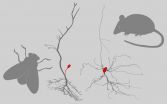Cannabis consumers show greater susceptibility to false memories
2015-04-21
(Press-News.org) The study conducted at Sant Pau and Bellvitge hospitals, published in the American journal Molecular Psychiatry and conducted with the use of neuroimaging techniques, demonstrates for the first time that cannabis consumers have a less active hippocampus, a key structure related to the storage of memories.
Consumers of cannabis show distortions in their memories and can even come to imagine situations which differ from reality.
The study compared the memories of consumers to that of non-consumers to find differences in the retention of situations and experiences.
The chronic use of cannabis can accentuate age-related memory problems.
Barcelona, 15 April 2015. - A new study published in the American journal with the highest impact factor in worldwide, Molecular Psychiatry, reveals that consumers of cannabis are more prone to experiencing false memories. The study was conducted by researchers from the Human Neuropsychopharmacology group at the Biomedical Research Institute of Hospital de Sant Pau and from Universitat Autònoma de Barcelona, in collaboration with the Brain Cognition and Plasticity group of the Bellvitge Institute for Biomedical Research (IDIBELL - University of Barcelona). One of the known consequences of consuming this drug is the memory problems it can cause. Chronic consumers show more difficulties than the general population in retaining new information and recovering memories. The new study also reveals that the chronic use of cannabis causes distortions in memory, making it easier for imaginary or false memories to appear.
On occasions, the brain can remember things that never happened. Our memory consists of a malleable process which is created progressively and therefore is subject to distortions or even false memories. These memory "mistakes" are seen more frequently in several neurological and psychiatric disorders, but can also be observed in the healthy population, and become more common as we age. One of the most common false memories we have are of situations from our childhood which we believe to remember because the people around us have explained them to us over and over again. Maintaining an adequate control over the "veracity" of our memories is a complex cognitive task which allows us to have our own sense of reality and also shapes our behaviour, based on past experiences.
In the study published in the journal Molecular Psychiatry, researchers from Sant Pau and Bellvitge compared a group of chronic consumers of cannabis to a healthy control group while they worked on learning a series of words. After a few minutes they were once again shown the original words, together with new words which were either semantically related or unrelated. All participants were asked to identify the words belonging to the original list. Cannabis consumers believed to have already seen the semantically related new words to a higher degree than participants in the control group. By using magnetic resonance imaging, researchers discovered that cannabis consumers showed a lower activation in areas of the brain related to memory procedures and to the general control of cognitive resources.
The study found memory deficiencies despite the fact that participants had stopped consuming cannabis one month before participating in the study. Although they had not consumed the drug in a month, the more the patient had used cannabis throughout their life, the lower the level of activity in the hippocampus, key to storing memories.
The results show that cannabis consumers are more vulnerable to suffering memory distortions, even weeks after not consuming the drug. This suggests that cannabis has a prolonged effect on the brain mechanisms which allow us to differentiate between real and imaginary events. These memory mistakes can cause problems in legal cases, for example, due to the effects the testimonies of witnesses and their victims can have. Nevertheless, from a clinical viewpoint, the results point to the fact that a chronic use of cannabis could worsen problems with age-related memory loss.
INFORMATION:
[Attachments] See images for this press release:

ELSE PRESS RELEASES FROM THIS DATE:
2015-04-21
New research led by NYU Langone Medical Center examines what happens when a patient with multiple sclerosis (MS) who is clinically stable stops taking their medication.
The international, multi-site study found almost 40 percent of patients had some disease activity return when they stopped taking their meds.
The findings were presented at the American Academy of Neurology Annual Meeting held April 18-25, in Washington, D.C.
"Despite long periods of disease stability while taking medication, we found a large minority of patients who stopped experienced relapses or disability ...
2015-04-21
PHILADELPHIA - RNA is both the bridge between DNA and the production of proteins that carry out the functions of life and what guides which and how much protein gets made. As messenger RNA (mRNA) is transcribed from DNA to carry genetic information out of the nucleus, segments that don't code for actual proteins need to be removed from the RNA strand and the remaining pieces spliced together. Different pieces of the expressed gene (exons) are cut out, and these sections are joined together to form the final mRNA strand. Cells gain their ability to produce proteins with ...
2015-04-21
Over the past 25 years, the construct of situation awareness (SA), or the perception and interpretation of what is happening around you, has been a catalyst for new advances in the human factors/ergonomics field, particularly in the areas of information display, automation, and training.
But recent advances also raise new questions, such as these: To what extent is SA about "awareness in the head" versus "awareness of where to look around you"? How is the process of maintaining SA affected by workload? Is it possible to have high-level SA about, for example, the progress ...
2015-04-21
Men with prostate cancer benefit from treatment with the pioneering drug olaparib - the first cancer drug to target inherited mutations - according to the results of a major trial presented today (Tuesday).
Olaparib was licensed in December for women with ovarian cancer and inherited BRCA mutations, but the new research suggests it could also benefit men with genomic faults within their tumours.
Researchers told the American Association of Cancer Research (AACR) conference in Philadelphia that up to 30 per cent of men with advanced prostate cancer had tumours with defects ...
2015-04-21
Human activity has removed more than one-tenth of trees and plants from the Amazon rainforest since the 1960s, a study shows.
Widespread removal of trees has contributed to a rise in the amount of carbon dioxide in the atmosphere, increasing the potential impact of climate change, researchers say.
Deforestation of the Amazon accounted for 1.5 per cent of the increase in carbon dioxide levels seen since the mid-nineteenth century, the team says.
However, this increased the total amount of carbon found in the atmosphere only very slightly compared with fossil fuel ...
2015-04-21
New research shows that fishing is having a significant impact on the make-up of fish populations of the Great Barrier Reef.
It's long been known that environmental impacts such as climate change and pollution are amongst the drivers of change on the Great Barrier Reef.
Now researchers from the ARC Centre of Excellence for Coral Reef Studies (Coral CoE) at James Cook University have found that removing predatory fish such as coral trout and snapper, through fishing, causes significant changes to the make-up of the reef's fish populations.
"A stable and healthy reef ...
2015-04-21
Nerve cells come in very different shapes. Researchers at the Bernstein Center Berlin now reveal why, in insects, the cell body is usually located at the end of a separate extension. Using mathematical models, they show that this increases the strength of electrical signal transmission at no additional energetic cost.
Nerve cells follow a functional design: They receive input signals over more or less ramified cell branches (dendrites), which they forward to other nerve cells along an elongated, thin cell process (axon). The cell body contains the nucleus with genetic ...
2015-04-21
A new study has found that internet discussion forums have positive links to well-being and are even associated with increased community engagement offline, contrary to a common perception of them being outdated and prone to trolling.
Research just published in the journal Computers in Human Behavior found that online forums have benefits for both individuals and wider society and are of greater importance than previously realised.
Although seemingly eclipsed in the past decade by social networking sites such as Facebook and Twitter, forums are still regularly used ...
2015-04-21
The U.S. Congress successfully hears the "supermajority" consensus on the reality and causes of climate change, according to scientists from Texas A&M University, Idaho State University, and University of Oklahoma. In a paper published in Climatic Change, the scientists suggest looking at business interests, partisan predispositions and political ideology for the hurdles to policy action.
"Different perceptions and claims among lawmakers are a major hurdle to agreeing on action to address global warming and these were thought to simply reflect scientific uncertainty," ...
2015-04-21
A number of research studies have shown that coffee helps to protect against breast cancer. A new study led by Lund University, has confirmed that coffee inhibits the growth of tumours and reduces the risk of recurrence in women who have been diagnosed with breast cancer and treated with the drug tamoxifen.
The study, which is a follow-up of the results the researchers obtained two years ago, was carried out at Lund University and Skåne University Hospital, in collaboration with researchers in the UK.
"Now, unlike in the previous study, we have combined information ...
LAST 30 PRESS RELEASES:
[Press-News.org] Cannabis consumers show greater susceptibility to false memories


